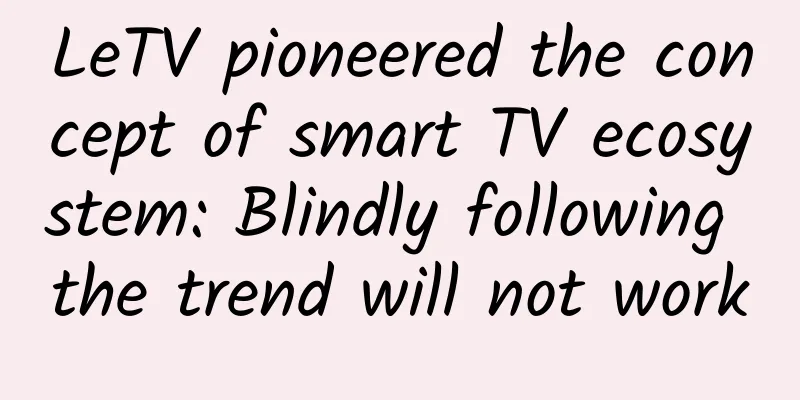LeTV pioneered the concept of smart TV ecosystem: Blindly following the trend will not work

|
In order to seize the entrance to smart TVs, major TV manufacturers have been accelerating the construction of the ecological chain of their own platforms. For example, Alibaba has cooperated with Wasu to establish content, game, and shopping platforms. Haier has extended its TV-centered smart home to LeTV. LeTV has launched the Le 4k ecological concept to create a video content platform aggregation, such as bringing together advertising platforms, film and television resources, 4K high-definition video and other new ways to play in the ecosystem. According to information, LeTV is the first Internet company to propose and practice the concept of "smart TV ecosystem". Today, it has built a complete industrial chain of "platform + content + terminal + application". The "ecosystem halo" has become one of LeTV's most dazzling halos, directly contributing to LeTV's eye-catching performance in the capital market. It was found that when the industry discusses the prospects of the smart TV market, price wars and configuration wars seem to have become old news. Only talking about the ecosystem can arouse the interest of the audience. The blue ocean market other than hardware is generally popular among TV industry players. However, how to layout the ecosystem, what type it is, where are the highlights, etc. have become topics of collective questioning. An ecosystem must be laid out In recent years, especially since the explosion of Internet TV last year, the intelligentization of the TV industry has become a general trend. It is only a matter of time before non-smart TVs are eliminated. Changhong Skyworth and others have already announced the suspension of production and focused on the smart TV market. The ecosystem dedicated to smart TVs has become a standard configuration and there is no choice. The reason why televisions are divided into "smart and non-smart" is inseparable from the launch of an innovative ecosystem. The ecosystem can effectively integrate platforms, content, and applications other than terminals, and thus become the DNA of smart TVs. It is imperative to continuously improve and deepen the synergy between the various elements of the ecosystem. It was found that, except for a few companies such as LeTV that have laid out a complete ecosystem, the development speed of the smart TV industry ecosystem is not satisfactory, the standards of software and hardware products are different, each brand acts independently, and there is no unified standard rule. Developers have little interest in smart TV platforms, and the number of participants is pitifully small. However, industry insiders generally predict that as more and more capital will be tilted towards smart TV platforms, the attention of the capital market will inevitably attract more software developers to join, thereby driving the rapid development of this industry. This situation will be significantly reversed in 2014, and next year is likely to enter an era of great explosion. Ecosystem construction will become a top priority. Take LeTV as an example. LeTV claims that it will achieve the first place in the industry in terms of comprehensive strength in the ecosystem, including platform, content, terminal, and application, and its annual revenue is expected to exceed RMB 10 billion. Jia Yueting, chairman of the company, said that in 2014, LeTV will form a large-scale enterprise cluster in the upstream and downstream of the LeTV ecosystem, including LeTV.com, LeTV Cloud Video, LeTV Pictures, LeTV TV, Letv Store, and LeTV Mall, and complete the transformation and upgrading from a platform-based company to an ecosystem-based company. Ecosystem gameplay In fact, most traditional TV manufacturers have long sought to transform into the smart TV market, and the pressure to build a smart ecosystem is increasing day by day. At present, the construction of each ecosystem can be described as a hundred flowers blooming and a hundred schools of thought contending, and they have built ecosystems that are in line with their own "national conditions" and "characteristics", but most of them are similar to LeTV and have obvious traces of imitation. For example, Xiaomi TV, although its shipments are pitifully small, may be Xiaomi is just playing around. Xiaomi has integrated software and hardware through independent research and development, transplanted the advantages of MIUI in mobile phones to the TV side, and cooperated with upstream suppliers for terminals. Although it has many years of experience in the operating system MIUI, its shortcomings are also obvious. The only content platform it can play is CNTV. In the field of content, Hisense can be said to have "gone to extremes". Hisense TV has recently aggregated the content and applications of 11 mainstream video websites, playing a content aggregation war. However, some industry insiders are not optimistic about this model, believing that it cannot balance the interests of various video companies, and the ecological model is not a mutually beneficial model and is difficult to sustain. On the other hand, LeEco's ecosystem has a complete industrial chain, integrated production and sales channels, and strong autonomy and innovation in both software and hardware construction, with a high threshold for replication. As Jia Yueting believes, although LeEco is engaged in ecological business, its organizational structure is specialized and divided. The industry's imitation of LeEco's ecosystem is just a glimpse of the whole picture. Not to mention whether there is a sense of synergy, it is not feasible from an operational perspective. This year's smart TV ecosystem war will be particularly exciting. Each TV manufacturer will use their own advantages to build a dedicated ecosystem, but how to balance and improve the most important areas of the ecosystem, such as platforms, content, terminals, and applications, will depend on their performance this year. Finally, a friendly reminder: blindly copying LeTV’s model may very well lead to your own death, but not learning how to build an ecosystem like LeTV is basically just waiting for death. As a winner of Toutiao's Qingyun Plan and Baijiahao's Bai+ Plan, the 2019 Baidu Digital Author of the Year, the Baijiahao's Most Popular Author in the Technology Field, the 2019 Sogou Technology and Culture Author, and the 2021 Baijiahao Quarterly Influential Creator, he has won many awards, including the 2013 Sohu Best Industry Media Person, the 2015 China New Media Entrepreneurship Competition Beijing Third Place, the 2015 Guangmang Experience Award, the 2015 China New Media Entrepreneurship Competition Finals Third Place, and the 2018 Baidu Dynamic Annual Powerful Celebrity. |
<<: Smart TV, let's talk about this industry
>>: Analysts say the iPod product line will be replaced by the iWatch
Recommend
Bacteria conspire, viruses eavesdrop: quorum sensing in microbes
A month ago, we reported that the 2022 Wolf Prize...
Humans tried to teach AI how to make a little sun, and the result was -
Recently, there was a big news in the field of nu...
Faced with the rampant porn industry, Miyazaki Hayao, who is dissatisfied with his desire, picks up his pen again
"It is better to die making animations than ...
Baidu's bidding system sets daily consumption. How long does it take for the price to recover after exceeding the limit?
Please explain your question clearly. If all keyw...
Yang Guozheng's Eye Method + Sanyuan Naqi (3 sets 5.07G)
Yang Guozheng's Shape Parent Eye Method + San...
Rocks are rocks, minerals are minerals? What are the differences?
Tuchong Creative First, let's look at the def...
Explore the Earth's Treasures! World Geoparks, Have You Got It?
Recently, UNESCO announced a list of 18 new world...
When the soil is "shouting acid", how can organic fertilizer "turn the tide"
When the soil is "shouting acid", how c...
To be honest! You really don’t need to take a shower every day in winter
Taking a bath in winter must be something that ma...
School is about to start. How can we help children adjust their mindset to welcome the new semester?
Winter vacation is coming to an end. Are your chi...
Nature: Climate warming may trigger species spread and virus evolution
There are at least 10,000 viruses in nature that ...
How can a barber shop make money with mini programs? How can a barber shop make appointments with mini programs?
Due to the impact of the epidemic, all walks of l...
May 4th Youth Day丨100,000 meters of youth! How many meters are you at?
Youth is full of vitality Spreading down and taki...
What exercise hurts your knees the most? You definitely didn’t expect…
Once you sit down, how long do you sit? 1 hour? S...
Breaking through the barriers of mountains and rivers, turning "natural barriers into thoroughfares", China's bridges are "world's first"
Audit expert: Wang Shengwei Senior Engineer, Beij...









